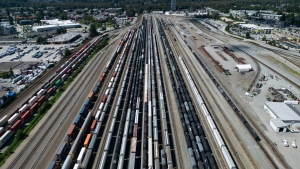The rail shutdown has officially begun as employees have been locked out of their jobs. This decision was made by the Canadian Pacific Railway (CPR) after negotiations with the Teamsters Canada Rail Conference (TCRC) failed to reach a resolution.
The lockout, which began at 10 p.m. on Tuesday, affects approximately 3,000 employees across Canada. These employees include conductors, engineers, and rail traffic controllers. The TCRC represents these workers and has been in negotiations with CPR for months, trying to reach a new collective agreement.
According to CPR, the lockout was necessary due to the TCRC’s refusal to accept the company’s final offer. The company states that their offer was fair and competitive, and that the TCRC’s demands were unreasonable and would have a negative impact on the company’s operations.
The TCRC, on the other hand, argues that CPR’s offer would result in a decrease in working conditions and benefits for their members. They also claim that the company has been unwilling to negotiate in good faith and has been using intimidation tactics to pressure the union into accepting their offer.
The lockout has already caused disruptions in rail service, with freight trains being halted and passenger trains being rerouted. This has also affected industries that rely on rail transportation, such as agriculture and manufacturing.
The federal government has expressed concern over the situation and has urged both parties to continue negotiations in order to reach a resolution. They have also stated that they are monitoring the situation closely and are prepared to intervene if necessary.
In the meantime, both CPR and the TCRC have stated that they are open to returning to the bargaining table to reach a new collective agreement. However, with no resolution in sight, it is uncertain how long this rail shutdown will last and what the impact will be on the Canadian economy.
This lockout is just the latest in a series of labour disputes between CPR and its employees. In 2018, there was a nine-day strike by TCRC members, and in 2012, there was a five-day strike by the union. It remains to be seen how this current situation will be resolved and what the long-term effects will be on both the company and its employees.



